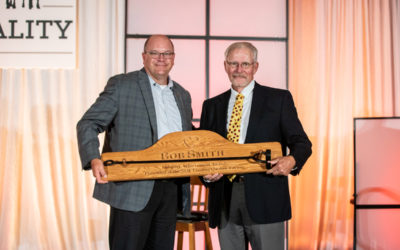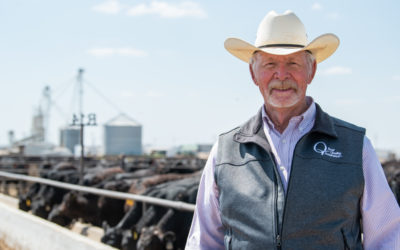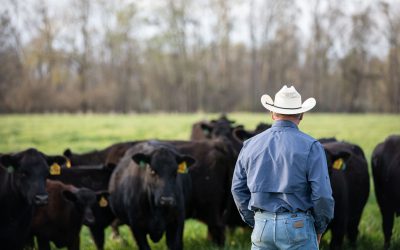
Older and wiser to BSE
Yes, that first case of bovine spongiform encephalopathy (BSE)–or “mad cow disease” if you must use the mainstream media’s term—in the United States sent shockwaves throughout the industry and the markets.
Last week I just happened to be reading over a transcript of Paul Clayton, of the U.S. Meat Export Federation, from last fall. I highlighted this passage in my notes:
“Obviously we were just devastated in 2003 with the finding of BSE cases. It just totally tore out foreign markets apart….Well of course in the last seven years we have built those things back and I think just recently we just gained some more momentum quicker than what we thought and we’re in pretty good shape in getting back to full recovery in both value and volume.”
Just as I lifted my Sharpie from the page, an e-mail came in. There were rumors of BSE. On Twitter, most of my ag journalism pals were already confirming it as fact. My first reaction was, “That changes my story.” And then I wondered, what does this do to the beef markets? How does it affect CAB?

I’d like to think I’m not the only one who wonders, so when I caught up with our resident expert on all things global, Geof Bednar (he’s the international director after all), I decided to share his answers with all of you:
1-What was your initial reaction to the recent news of another case of BSE in the United States?
“In one sense, very little concern as the cow identified was atypical, and that the system works and this is not a human health concern. Our licensee base, especially from the distributor and importer perspective, is well educated on BSE.
My caution arises from how this can become a political posturing item that slows returning full access into Japan and other key U.S. beef partners. Korea was quick to react from a retailer perspective and many of us were not surprised. Yet Korea remains one of our most key destinations for U.S. beef, especially Certified Angus Beef.
The manager of a licensed steakhouse in Taiwan told me right afterwards, “We all know BSE, even our customers who are doctors here in Taiwan know BSE very well. They are not afraid of BSE at all; problem is, people view this issue from political perspective, with magnifier, that slows and jeopardizes the whole restaurant business island-wide.’”
2-What types of questions will your customers and accounts have?
“I have received only one question from our nearly 100 licensed international distributors. Our largest distributor in Japan and one of the largest importers of U.S. beef was quick to ask about the age of the identified cow. This was a great question as we continue to try to overcome our limited access due to under-20-month cattle. Many believe that there is a real opportunity to see increased access in Japan sometime during the second half of 2013.”
3-How was the reaction to the 2003 BSE case different than subsequent cases?
“Generally our trading partners, and most importantly our customers and consumers, have gained increased knowledge on BSE and the controls in place. The power of flavor that U.S. beef, specifically the CAB brand, delivers has a strong following worldwide and ultimately this drives our short- and long-term ability to partner with people throughout the globe.”
4-In terms of building foreign relationships and exports, what has our industry learned since 2003 that will help us now?
“We were not as connected as we needed to be from a customer-service standpoint. Today, our focus is not only on making the sale, but educating and empowering our partners to showcase our beef’s attributes. We teach them to tell our story on the industry that provides a superior eating experience with a sincere concern for safety, wholesomeness and environmental stewardship. We also have to recognize and praise the importance of our many international U.S. Meat Export Federation (USMEF) offices worldwide that have highly trained, dedicated and passionate people telling the U.S. beef story to their countrymen.”
6-Realizing that you have to speculate a lot, what can you say about what this news means for our brand specifically?
“We are fortunate that we continue to align with the best potential brand partners worldwide. We believe in and want to grow the strongest personal and business relationships that we can. This leads to a level of trust and commitment where our partners are highly committed and successful. As an example, I learned from a recent visit to Taiwan that our partner sees these types of challenges as a real opportunity for them to differentiate themselves from competitors.”
While I can remember what my reaction was last Tuesday afternoon, I’m happy to report that memory won’t be quite as ingrained this time around.
As my friend Holly Spangler said on her Prairie Farmer blog, “It feels different this time, though. We seem a little more educated, a little more reasonable.”
It’s nice to know that might be by design, a concerted effort by people all over the world. It’s even nicer to know that it seems to be working.
May your bottom line be filled with black ink,
~Miranda
You may also like
Smith receives Industry Achievement Award at Feeding Quality Forum
The hands of a veterinarian hold the life cycle of an animal in their care. The mind, however, directs the hands. Anyone who’s met Dr. Bob Smith knows the way he thinks is something else. It’s come from more than 30 years in the industry caring for its people and cattle. It’s why he earned the 2021 Industry Achievement Award.
Of cattle care and human flourishing
Dr. Bob Smith, or “Doc Bob,” is the kind of man that looks to others’ success before his own. One that endeavors to be a life-long learner and shares that knowledge with anyone it’ll help. He’s also our 2021 Industry Achievement Award recipient.
Progress from small steps
Every day is a chance to learn and get better. Thousands of others like my new friends in Alabama are taking steps to meet the shifts in consumer demand, and to know more. Small steps in the right direction can start now. Even if it’s just recording a snapshot of where you are today, a benchmark for tomorrow.



